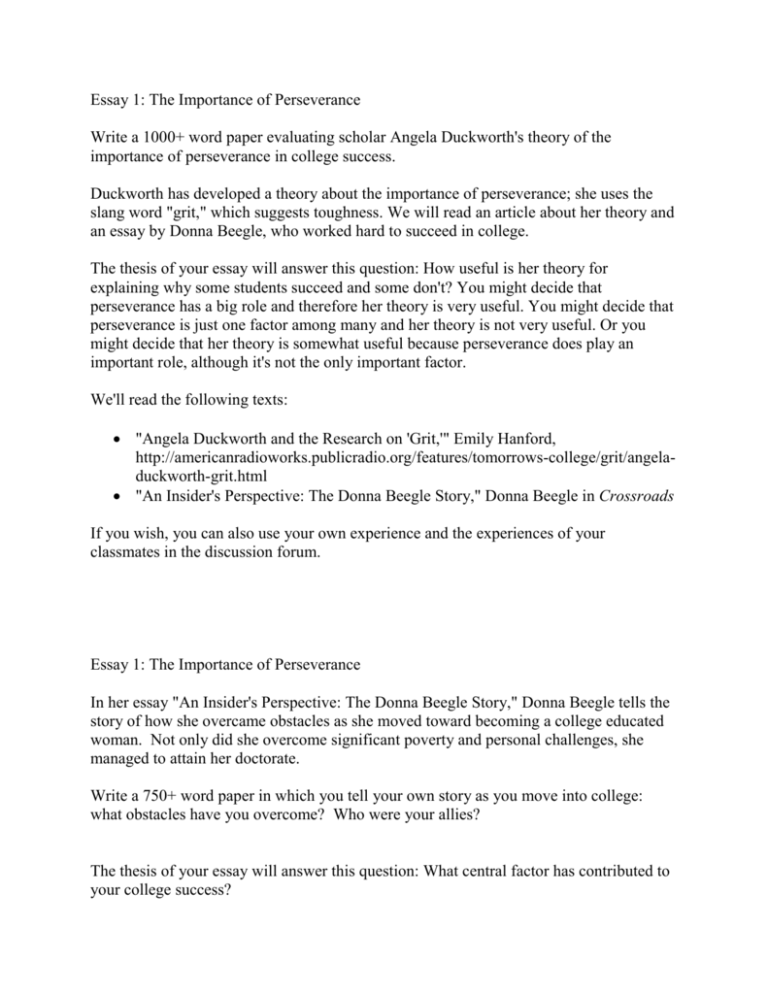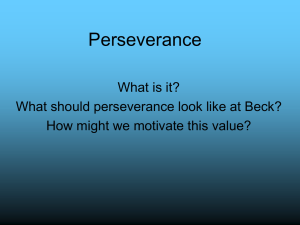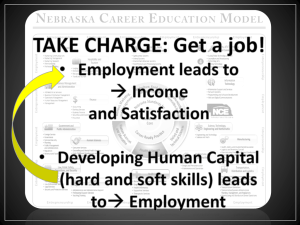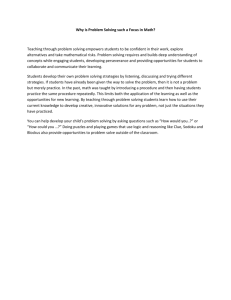Crossroads - Achieving the Dream
advertisement

Essay 1: The Importance of Perseverance Write a 1000+ word paper evaluating scholar Angela Duckworth's theory of the importance of perseverance in college success. Duckworth has developed a theory about the importance of perseverance; she uses the slang word "grit," which suggests toughness. We will read an article about her theory and an essay by Donna Beegle, who worked hard to succeed in college. The thesis of your essay will answer this question: How useful is her theory for explaining why some students succeed and some don't? You might decide that perseverance has a big role and therefore her theory is very useful. You might decide that perseverance is just one factor among many and her theory is not very useful. Or you might decide that her theory is somewhat useful because perseverance does play an important role, although it's not the only important factor. We'll read the following texts: "Angela Duckworth and the Research on 'Grit,'" Emily Hanford, http://americanradioworks.publicradio.org/features/tomorrows-college/grit/angeladuckworth-grit.html "An Insider's Perspective: The Donna Beegle Story," Donna Beegle in Crossroads If you wish, you can also use your own experience and the experiences of your classmates in the discussion forum. Essay 1: The Importance of Perseverance In her essay "An Insider's Perspective: The Donna Beegle Story," Donna Beegle tells the story of how she overcame obstacles as she moved toward becoming a college educated woman. Not only did she overcome significant poverty and personal challenges, she managed to attain her doctorate. Write a 750+ word paper in which you tell your own story as you move into college: what obstacles have you overcome? Who were your allies? The thesis of your essay will answer this question: What central factor has contributed to your college success? Principles for Accelerated Pedagogy -- Katie Hern, Chabot College #1: Engages students in intellectually challenging experiences that develop the most essential skills and ways of thinking required in college. #2: Attends to the affective issues that get in the way of students’ learning and success. #3: Facilitates an ongoing metacognitive conversation with students about what they are learning, why they are learning it, where the process breaks down for them, and how they can successfully approach it. #4: Recognizes that mastery doesn’t happen all at once – celebrates emerging strengths, maintains a constructive, non-shaming orientation toward problems in student work, focuses on growth. (“College-readiness” ≠ Mechanical perfection) Take away messages (wswyt@highline.edu; lbernhagen@highline.edu; Accelerating to a new paradigm) 1. It doesn’t matter how successful individual developmental courses are; we must shorten the pipeline. 2. Acceleration takes many forms. Each institution must work with their structures, advantages, and challenges to develop what works. 3. Acceleration is not tied primarily to a curriculum “model”; pedagogy must also be accelerated. 4. We need to consciously and intentionally work against placement and traditional textbooks, both of which limit developmental curriculum and do not effectively address college readiness.







